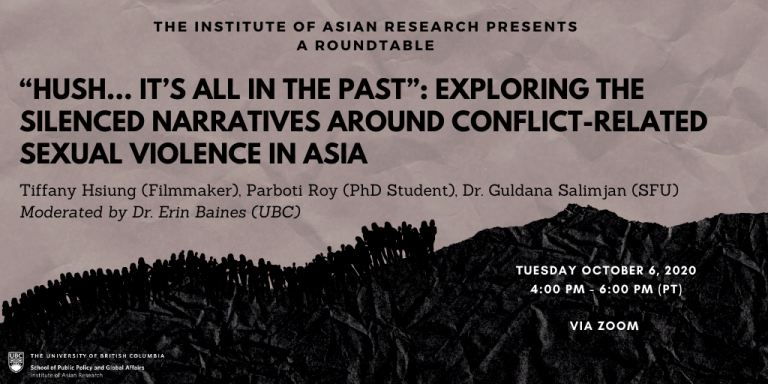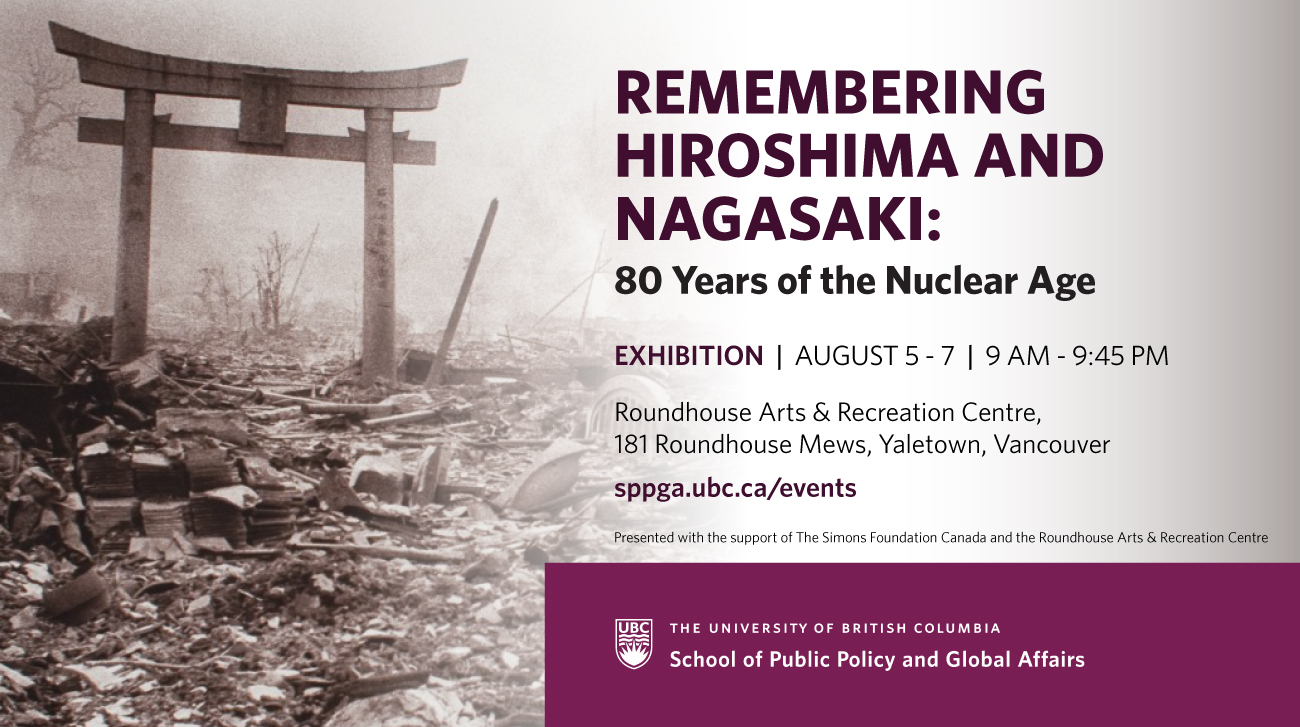Join us for the first major event of the term by the Institute of Asian Research at the UBC School of Public Policy and Global Affairs. By exploring different examples of “sexual violence” in Asia presented by three different panelists, we hope to generate an informed discussion on how to understand and respond to “sexual violence” perpetrated by the state across Asia. In addition, in honour of the 20th anniversary of the United Nations Security Council Resolution on Women Security, we hope to discuss the limits of current global governance in addressing the issue of conflict-related “sexual violence”.
This webinar aims to stimulate conversation around conflict-related “sexual violence” as a way to remind ourselves that “sexual violence” remains a major issue that is often overlooked. We hope to inspire people to educate themselves and join in the movement in part to prevent “sexual violence” perpetrated by the state.
Why “sexual violence” not sexual violence?
Throughout our research, we learned that “sexual violence” is a complex term that cannot be accurately defined or quantified. Therefore, we placed the term in quotation marks in order to take steps to avoid a rigid definition of the term by placing too heavy a focus on “actively violent” examples while neglecting other forms of violence such as forced assimilation through marriage. Rather than adopt the standard definition of sexual violence, we plan to use this webinar as an attempt to de-structuralize and unpack the term. By looking at three different examples, we are hoping that this would demonstrate the complications that the term holds.
Please RSVP – Zoom link to be emailed to registrants closer to the event.
For any questions or issues, please contact Bianca Chui
Date: Tuesday October 6, 2020
Time: 4PM – 6PM PT


Panelists:


Tiffany’s presentation centres around a critical question. How do we perpetuate the shame and stigma that leads to silence for survivors of sexual violence? This will be discussed through her experience of documenting the lives of for sex slaves during World War II in Asia.
About Tiffany
Tiffany Hsiung is an award-winning filmmaker. Her debut feature length documentary The Apology (2016) produced by the National Film Board of Canada, has won over a dozen awards internationally. This includes the prestigious Peabody Award, Dupont Columbia award, best documentary at Busan International Film Festival and Oslo International Film Festival to name a few. Hsiung is also the recipient of Allan King memorial award from DOC Canada and a winner of the Peabody – Futures of Media Award (2018) and a Canadian Screen Award for Best Original Digital Production for The Space We Hold (2017). Her recent film Sing Me a Lullaby (2020) had a world premiere at the 45th Toronto International Film Festival which earned the Inaugural Share Her Journey Short Cuts Award at TIFF. Hsiung’s passion both in filmmaking and education sparks a unique energy to change the status quo and bring critical stories to audiences around the world. More information on Hsiung can be found on her website.


Parboti’s discussion topic covers gendered and sexual violence against Indigenous women in the Chittagong Hill Tracts (CHT), Bangladesh and how militarization, illegal settlement of non-Indigenous population and the culture of impunity led to the violation of indigenous women’s human rights and access to justice.
About Parboti
Parboti Roy is a Ph.D. student in the Department of Asian Studies, UBC. She hails from Chakma Indigenous community, Chittagong Hill Tracts, Bangladesh. Her research interest broadly focuses on Indigenous women issues, gender-based violence, resistance politics, and indigeneity in South Asia.


In this talk, Guldana discusses these questions: what is the gendered dimension in the ongoing ‘People’s War on Terror’ in Xinjiang Uyghur Autonomous Region, northwest China? How should we understand the intersectionality of gender and race and the way sexual violence manifests itself in this context?
About Guldana
Guldana Salimjan is the Ruth Wynn Woodward Junior Chair at the Gender, Sexuality, and Women’s Studies department at Simon Fraser University. Her research focuses on the politics of memory, representation, gender, and nationalism. More information on Guldana.
Hosted by: The Institute of Asian Research, School of Public Policy and Global Affairs, UBC




